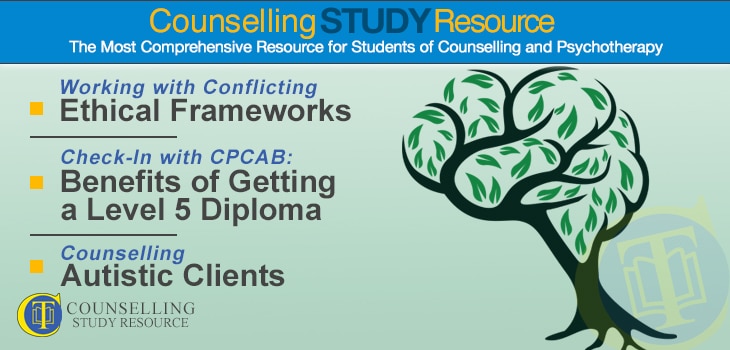151 – Benefits of Getting a Level 5 Diploma in Counselling
Working with Conflicting Ethical Frameworks – Counselling Autistic Clients
In episode 151 of the Counselling Tutor Podcast, Ken Kelly and Rory Lees-Oakes discuss the challenge of working with conflicting ethical frameworks. ‘Check-In with CPCAB’ then looks at the possible benefits of getting a Level 5 diploma in counselling. Finally, in ‘Practice Matters’, Rory interviews Lisa Cromar about counselling autistic people.
Working with Conflicting Ethical Frameworks (starts at 2.55 mins)
A question that arises regularly in the Counselling Tutor Facebook group is how we can work with conflicting ethical frameworks; this is a common assignment question for students of counselling and psychotherapy.
Examples of work environments in which there may be conflicting ethical frameworks would be:
- school counselling, where the school’s code of conduct may not be consistent with, say, the Ethical Framework for the Counselling Professions (published by the British Association for Counselling and Psychotherapy, 2018)
- drug and addiction agencies, where confidentiality may not apply to the taking of street drugs (for reasons of physical safety of the clients).
If you encounter a conflict in ethical frameworks, it can be challenging to work out which to abide by, and how to blend the requirements of each. Rory and Ken suggest the following tips:
- Ensure that you fully read and understand both ethical frameworks, asking questions if you are unsure about any part of these.
- Sort the components of each into ‘must-dos’ (i.e. essential parts that you must abide by) and ‘nice-ifs’ (i.e. parts that are negotiable).
- Explain to colleagues your own must-dos, and listen to theirs and their rationale for these.
- Blend both into a contract that fits the essential requirements of the essential parts of the two frameworks, remembering that sometimes appropriate adjustments can be justified to best serve the client.
- Evidence your approach in writing.
- Do discuss any such conflicts with your clinical supervisor.
- Ensure too that you are familiar with the Caldicott Principles.
Rory has written a checklist on working with conflicting ethical frameworks. This is available here, or you can get hold of it through Counselling Study Resource (CSR).
Check-In with CPCAB: Benefits of Getting a Level 5 Diploma in Counselling (starts at 17.10 mins)
Rory talks to Heather Price (Senior Counselling Professional) at CPCAB (Counselling & Psychotherapy Central Awarding Body) about the reasons for counsellors deciding to top up their level 4 diploma with a level 5 qualification.
In general, Heather suggests working for a while (at least a year) with your level 4 diploma before considering getting a level 5 diploma in counselling.
Some counsellors choose to take the CPCAB’s Level 5 Diploma in Cognitive Behavioural Therapeutic Skills and Theory, in order to specialise and add another modality to their offering.
Other counsellors, meanwhile, choose to take the Level 5 Diploma in Psychotherapeutic Counselling, which is especially suited to those who wish to work in private practice.
Each of these two courses takes one academic year to complete.
The Diploma in Psychotherapeutic Counselling focuses particularly on assessment of clients (and includes practical experience in this). It also covers many other areas that support private-practice work, for example:
- creating and working with cancellation policies
- taking payments
- setting and maintaining boundaries in independent practice
- safe working
- writing reports for other professionals.
You can find more information about CPCAB on its website. CPCAB is the UK’s only awarding body run by counsellors for counsellors.
Counselling Autistic Clients (starts at 30.15 mins)
In this segment of the Counselling Tutor Podcast – aimed at qualified practitioners – Rory talks to counsellor Lisa Cromar about the lecture she delivered recently for Counsellor CPD.
This lecture looks at the differences that an autistic person may bring, what it is like to live with autism, and how to work effectively with autistic clients.
Rory and Lisa look at the coming-of-age of neurodiversity, as society’s recognition and understanding increases of the fact that people view and process the world in different ways.
In particular, they discuss:
- preferred ways of referring to autistic people, and the importance of individual choice in this within the counselling context
- aspects of counselling that you may need to adjust to meet the needs of autistic clients, particularly modes of communication
- creative ways of working with autistic clients
- useful techniques to use in counselling autistic people.
You can hear Lisa’s lecture at Counsellor CPD, which is a brand-new service aimed at qualified counsellors. There, we have over 150 hours of formal lectures, all linked to learning outcomes, delivered by experts in the field, and with downloadable slide packs and CPD certificates.
Free Handout Download
Working with Conflicting Ethical Frameworks
